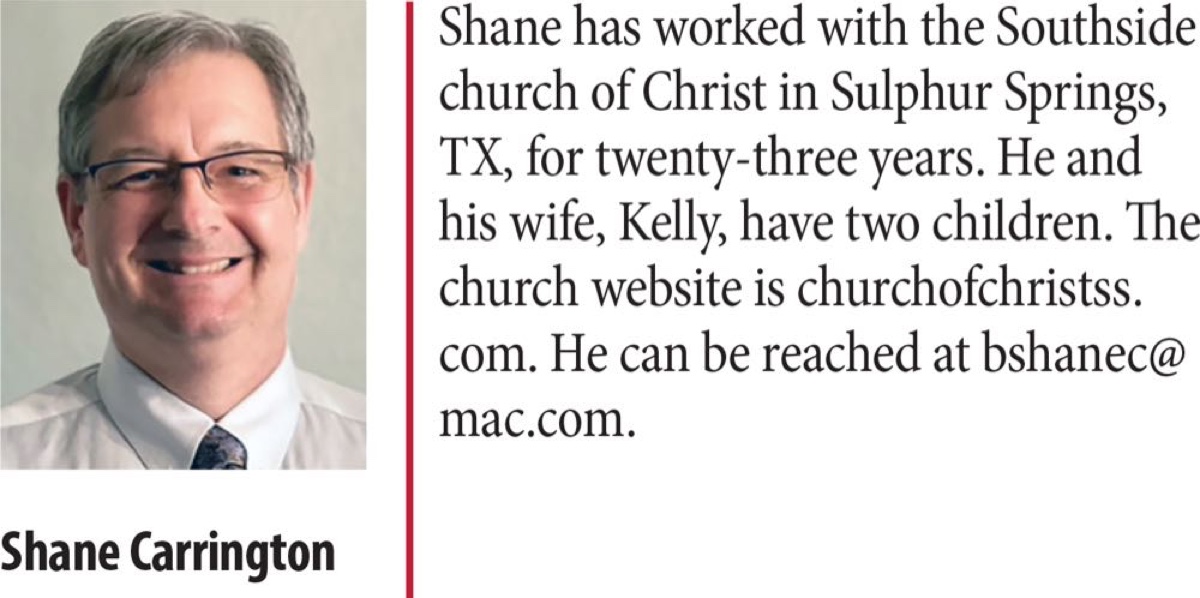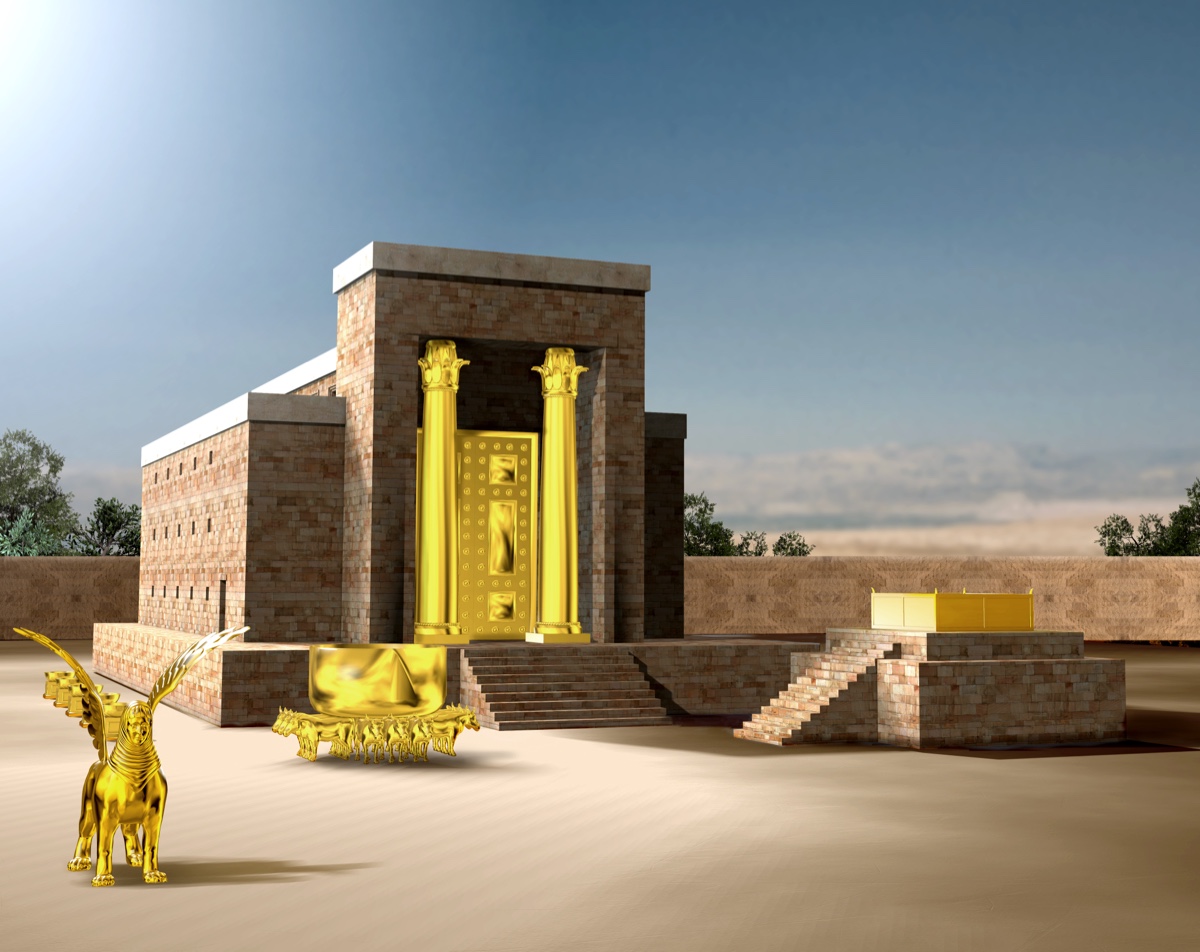By Shane Carrington
Synopsis: As ancient Israel’s temple represented the holiness and glory of God, our lives should reflect God’s holiness (1 Pet. 1:14-16) and point to His glory (Matt. 5:13-16) as we submit to the written word inspired by the Holy Spirit (Eph. 3:3-5).
Or do you not know that your body is a temple of the Holy Spirit who is in you, whom you have from God, and that you are not your own? For you have been bought with a price: therefore glorify God in your body (1 Cor. 6:19-20, NASB).
That the Holy Spirit indwells the believer cannot be disputed. Many passages affirm this truth (1 Cor. 3:16-17; 6:19-20; Gal. 4:6-7; Eph. 3:14-19; 5:18-20; Rom. 8:9-11, 14-17; etc.). What such Scriptures mean—and how the Spirit’s indwelling is accomplished—has long been the subject of vigorous discussion.
A casual reading of this text sounds to some like the Holy Spirit mystically indwells the physical bodies of Christians: “your body is a temple,” and “the Holy Spirit who is in you.” Is the Holy Spirit’s literal, mystical indwelling in the human body being taught in these statements, or are they figurative expressions conveying something else? If there are no figures of speech in this passage, a literal indwelling gains traction, but if figurative expressions are present, these sayings mean something else.
Israel possessed a literal, physical temple (and the tabernacle which preceded it). Under the Mosaic system, it was described as “the house of the Lord” (Exod. 23:19; 34:26; Deut. 26:13; Josh. 6:24; 1 Sam. 1:7; 1 Kings 5:3-5; 6:1; 7:12; 8:1-64; etc.). As such, it served several important purposes. It was the place. . .
from which God made His word known (Exod. 33:7-11).
to which ancient Israel must go to offer sacrifice (Exod. 20:24).
that represented God’s presence, holiness, and glory (Exod. 40:34-38; 2 Chron. 5:1-14; Lev. 10).
Consequently, the tabernacle/temple was the central feature in ancient Israel. While the temple was “the house of the Lord,” it was not where God actually lived:
However, the Most High does not dwell in houses made by human hands; as the prophet says: “Heaven is My throne, And earth is the footstool of My feet; What kind of house will you build for Me?” says the Lord, “Or what place is there for My repose?” (Acts 7:48-49; quoted from Isa. 66:1-2).
The temple was the intersection between God and Israel, where God connected with them. However, the Creator’s glory and presence are not confined to His creation—Yahweh cannot be bottled up in a physical structure made by hands (Acts 7:48; Ps. 139). The temple was a representative dwelling, but God’s throne is in heaven (Matt. 5:34-35; 6:9; 23:22; etc.).
The temple represented God’s presence, holiness, glory, and will, but He did not literally indwell it as a house (Acts 7:48-49 and Isa. 66:1-2, see above). Therefore, when the Holy Spirit says, “your body is a temple of the Holy Spirit” (1 Cor. 6:19), the inspired apostle is not affirming that the Holy Spirit literally lives in the fleshly bodies of Christians. Rather, he is teaching that the life we live is to be used for God’s purposes, not sinful activity. The context makes this clear.
Paul contrasts the “unrighteous,” who live sinfully, with the righteous (“washed. . . sanctified. . . justified”) who do not (1 Cor. 6:9-11). One’s manner of living, not a mystical indwelling, is the emphasis.
“Yet the body is not for immorality, but for the Lord. . .” (1 Cor. 6:13). One’s manner of living, not a mystical indwelling, is the emphasis.
“. . .your bodies are members of Christ. . . Shall I then take away the members of Christ and make them members of a prostitute?” (1 Cor. 6:15). One’s manner of living, not a mystical indwelling, is the emphasis.
“. . .the one who joins himself to a prostitute is one body with her. . . For He says, ‘The two shall become one flesh.’ But the one who joins himself to the Lord is one spirit with Him” (1 Cor. 6:16). One’s manner of living, not a mystical indwelling, is the emphasis.
“Flee immorality. . . sin that a man commits. . . the immoral man sins against his own body” (1 Cor. 6:18). One’s manner of living, not a mystical indwelling, is the emphasis.
Lastly, because “your body is a temple of the Holy Spirit. . . you are not your own. . . therefore glorify God in your body” (1 Cor. 6:19). Manner of living, not mystical indwelling, is the emphasis.
As faithful expositor, Elmer Moore, used to say, “The Holy Spirit indwells your life.” God wills that we use our bodies in a manner consistent with His revealed word. He wants us to live our embodied lives to His honor and glory, and the Holy Spirit revealed the manner and motivations for that life! That’s what Paul is teaching.
The Bible’s basic message is simple enough for the masses to understand, yet deep enough for scholars to spend a lifetime studying its nuances. Most of us prefer straightforward bullet-pointed teaching, but the Bible contains different kinds of literature with truth expressed in a variety of ways. When Jesus said of King Herod, “Go and tell that fox. . .” (Luke 12:32), He did not mean Herod had pointed ears and a bushy tail. Figures of speech populate every page of the Bible! Parables were Jesus’s predominant method of teaching. To literalize, mock, or minimize figures of speech is to use biblical language unbiblically. How can you discuss the fathomless glory of the infinite God without using approximations (figures)? To study the Bible well requires learning how to use figures of speech.
What figure of speech is God using when He says, “Your body is a temple of the Holy Spirit”? Metonymy! It is hard to spell, but here’s what it means:
The substitution of the name of an attribute or adjunct for that of the thing meant, for example, “suit” for “business executive” (Oxford Dictionary).
“the change of one noun for a related noun” (Bullinger’s Figures of Speech, 538-539; cf. Dungan’s Hermenutics, 70ff)—For example, “the Spirit by measure” (John 3:34) actually refers to the gifts the Spirit bestows, not the person of the Spirit.
“. . .a figure of speech (substitution) involving cause and effect” (Grasping God’s Word, 385). To illustrate, “They have Moses and the Prophets. . .” (Luke 16:29), mentions the writers (causes) for their writings (effects). Moses and the Prophets had been long dead, but their writings remained!
In 1 Corinthians 6:19-20, the Holy Spirit (the “cause”) is mentioned while godly living (the “effect”) is actually under discussion: “therefore glorify God in your body”! How does the Holy Spirit lead us to use our bodies (lives) in ways consistent with God’s holiness? He does so by instructing us through the word that He revealed!
For to us, God revealed them through the Spirit; for the Spirit searches all things, even the depths of God. . . the thoughts of God no one knows except the Spirit of God. Now we have received. . . the Spirit who is from God, so that we may know the things freely given to us by God, which things we also speak, not in words taught by human wisdom, but in those taught by the Spirit, combining spiritual thoughts with spiritual words (1 Cor. 2:10-13).
Consider the comments of Joseph Henry Thayer, who said concerning language that is descriptive of one person being “in” another:
[It is used, SC] . . .of a person to whom another is wholly joined and to whose power and influence he is subject, so that the former may be likened to the place in which the latter lives and moves. . . of intimate relationship with God or with Christ. . . the idea of power and blessing resulting from that union (Thayer, 210).
Relationship and influence, not geographical location, is the point (cf. John 4:24; 17:20-23).
The Holy Spirit indwells us! Yet, this occurs neither mystically nor directly. He affects our embodied lives as we listen to, absorb, and follow His teaching revealed in Scripture. How does this impact personal holiness? “The Sanctification of the Spirit” will be next month’s article! Keep reading, studying, and following Sacred Scripture, for that is how the Holy Spirit speaks to us and indwells us (cf. Eph. 5:18-19 with Col. 3:16). Let Him change you from the inside out!
Bullinger, E.W. Figures of Speech Used in the Bible. Grand Rapids, MI: Baker Book House, 1968.
Duvall, J. Scott and J. Daniel Hays. Grasping God’s Word. 3rd ed. Grand Rapids: MI: Zondervan, 2012.
Dungan, D.R. Hermenutics: A Text-book. 3rd ed. Cincinnati, OH: The Standard Publishing Company, 1888.
Thayer, J.H. A Greek-English Lexicon of the New Testament. Grand Rapids, MI: Baker Book House, 1977.


